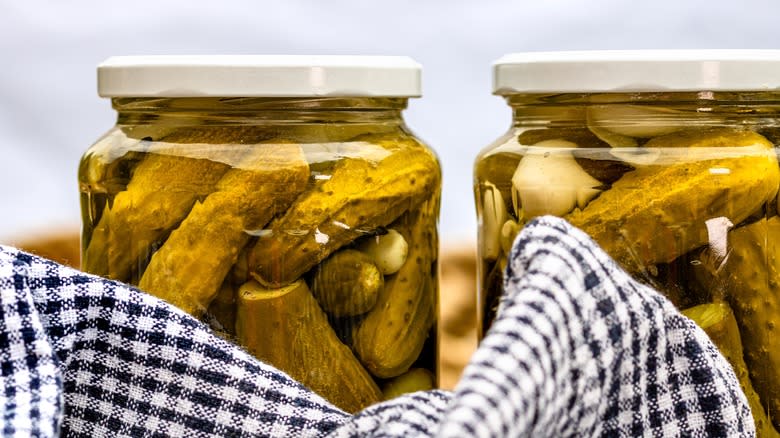Why Knowing Vinegar's Acidity Level Is Key To Successful Homemade Pickles

It's hard to top the juicy, tangy and crunchy notes of a good pickle. Although the preservation technique is commonplace, there's still a certain mystique to its transformative qualities. After all, not only does the cucumber take on a new mouth-watering flavor, but it also becomes shelf stable, too.
It's all due to the brine's acidic composition, hence why vinegar is such a crucial ingredient. When it's done just right, the dangerous bacteria will perish when the pH lowers, all the while the tasty tanginess emerges. In nearly all recipes, the ideal concentration is a vinegar with 5% acetic acid, which thankfully coincides with many bottles on the market. However, you'll always want to double check the acidity level before crafting a batch, as a mild vinegar won't make your pickles food safe, while an industrial vinegar might even burn you.
Balanced bottles like apple cider or distilled white vinegar are the most popular candidates, and they are what you'll need to craft a perfect batch of classic dill pickles. Other examples like malt vinegar work too, but are a little less popular due to their flavor. You'll want to watch out for salad vinegars and leave the rice wine vinegar for sushi. Those vinegars don't pack in enough acid. And don't tinker with more industrial vinegars super high in acid -- they might be unsafe for consumption. Stick to the dependable classics for the tastiest pickle result.
Read more: 16 Worst Canned Foods You Can Buy
The Vinegar's Acidity Level Ensures Good Pickle Flavor And Safe Consumption

Of course, there are things other than vinegar to consider when crafting a batch of pickles. And for such additions, you'll need to consider the interactions with the central acidic ingredient. For instance, you'll definitely need some salt in the mix, for which it's best to stick to kosher. Varieties with iodine will not only inspire off-putting flavors, but they can even cloud your pickle jar.
There's more flexibility when it comes to other aromatics. You can always experiment with spices, perhaps some Old Bay to give your pickles a kick, or stick to a dependable pickling mix. And to top it off, there are options with herbs, as well as onions, garlic, and some sugar to round out the brine. Such additions won't impact the vinegar's preservative nature, but you should avoid diluting the brine with water and other liquids. Once you've made a batch with the perfect balance of acidity and flavor, feel free to reuse it until it changes color. Or at the very least, copy down your initial ratios so you know that the recipe will turn cucumbers into tasty pickles time after time.
Read the original article on Tasting Table.

 Yahoo Lifestyle
Yahoo Lifestyle 
